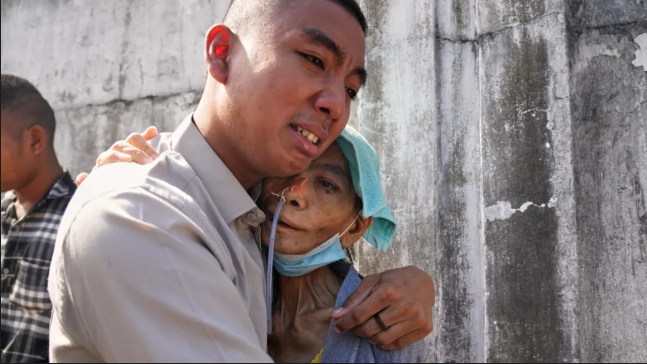Burmese regime uses amnesty to intimidate civilians ahead of elections
Myanmar's military junta has released more than 3,000 political prisoners and dropped charges against another 5,500 people. Friends and relatives of the prisoners rejoiced yesterday, but it is also a threat to the population, who find themselves forced to vote in order to avoid arrest. This has been confirmed by the military itself: more than 700 prisoners will only be released on parole and risk returning to prison at the first sign of dissent.
Yangon (AsiaNews) - Myanmar's military junta yesterday granted amnesty to more than 3,000 political prisoners and dropped charges against another 5,500 people who had been charged with spreading comments critical of the Burmese regime.
The release of about 200 prisoners took place yesterday at the notorious Insein prison in Yangon: at least eight buses of prisoners were greeted by friends and relatives who had been waiting since dawn, and several photos were then posted online.
However, this is not a benevolent gesture or an attempt at reconciliation: the state broadcaster MRTV explained that the amnesty was granted “to ensure that all eligible voters can vote freely and fairly in the upcoming democratic multi-party general elections”. International bodies and humanitarian organisations have repeatedly pointed out that these are in fact sham elections because the military junta does not control the entire territory (in several parts of the country, the army is still clashing with the militias that make up the resistance) and the participation of the opposition has never been contemplated.
Dozens of political parties, including Aung San Suu Kyi's National League for Democracy (who, at 80, remains in prison, but in the military capital, Naypyidaw), had already been dissolved in 2023.
Following the announcement of the elections, which will be held in several stages starting on 28 December, the junta has intensified its attacks on the resistance and introduced new laws criminalising activities that hinder the electoral process.
Yesterday, specifically, the National Defence and Security Council authorised the release of 3,085 prisoners convicted under Section 505(a) of the Penal Code, which punishes the dissemination of “false information” or comments that “generate fear among the population”.
This is a law that has been widely used against anyone who has criticised the regime since the 2021 coup. According to the Assistance Association for Political Prisoners, 30,031 people have been arrested in the last four years, of whom 22,708 are still in detention.
Yesterday's amnesty should therefore be seen as a threat to the civilian population: vote or face imprisonment. This is a very difficult position for Burmese citizens to support: many refuse to support the junta but feel they have no alternative.
The elections, especially if they have a high turnout, serve the Naypyidaw regime to consolidate its government and normalise relations with other countries.
China, a supporter of the coup junta, has long expressed its support for the electoral process, and several other countries in the region interested in doing business in Myanmar, including India, have proposed sending international observers.
This is not the first time that the military regime has granted broad amnesties, usually on the occasion of important Buddhist holidays, to consolidate its power: in January, nearly 6,000 prisoners were released, but only about 600 were political prisoners.
This time too, 724 of the 3,085 prisoners released yesterday were explicitly granted conditional release. This means that in the event of new offences, they will be returned to prison, where they “will have to serve the new sentence together with the remaining sentence”. Again, this would not be the first time that the generals have returned prisoners to their cells after releasing them.







.png)










